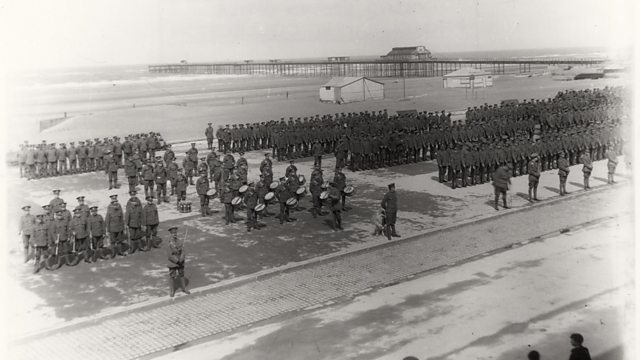Rhyl Promenade: Military Training turns into Minersβ Strike.
Military training turns into minersβ strike on Rhyl promenade.
At the beginning of World War One, Irving Henry Jones was 16 years old, he quickly signed up under the pretence of being 21. Leaving behind the mines of Bedwas, South Wales, Irving headed off for military training which began on Salisbury Plain and then swiftly continued in Rhyl, North Wales.
Dressed in his buttoned boots and boater on his head, Irving went on parade in Rhyl while waiting for a uniform. He was in his element, particularly when it came to physical training and thrived on activities such as boxing and racing.
The menβs training was varied as it wasnβt yet established which division theyβd eventually be part of. From gas attacks to marksman training and signalling, a great deal was covered. Rifle drill began with wooden sticks, later switched for dummy rifles before acquiring βthe real thingβ.
While training, Irvingβs regiment was subject to a check from βexpertsβ seeking out underage soldiers. Irving explains that despite his young age he was shaving twice a day, so he jutted out his jaw and managed to pull the wool over the inspectors eyes because.. βI wanted to go!β.
Irving explains that the majority of the Welch Regiment were miners, which he felt characterised them in a rather unique way. When their promised leave to visit home didnβt happen, the men decided to meet to discuss the matter βjust like a meeting on top of the pitβ. A decision was made to strike.
While on parade on Rhyl sea front, the bugle went for the men to βfall inβ, but nobody moved! After explaining themselves, the minersβ strike produced the desired result and the soldiers in training were granted their leave home from Rhyl.
Irving has fond memories of his training in Rhyl as well as for the local community there. Billeted to No.6 Gronant Street, Irving recalls that he was taken in βlike a sonβ.
After specialising as a signaller, it was time to leave for France. The affectionate send off from the community along with gifts and best wishes were a highlight that Irving recalls.
It wasn't until September 1915 that Irving boarded a ship to travel to the France, sailing at night in an attempt to avoid being spotted by German submarines. Overcome with seasickness Irving remembers βI wanted to die before I got thereβ.
Location: Rhyl Promenade, LL18 3AY.
Image: Royal Welch Fusiliers on the promenade at Rhyl, c.1915. Courtesy of Flintshire Archives
Duration:
This clip is from
Featured in...
![]()
Latest stories from across the UK—World War One At ΒιΆΉΤΌΕΔ
A selection of stories from At ΒιΆΉΤΌΕΔ's November release.
![]()
Recruitment & Training—World War One At ΒιΆΉΤΌΕΔ
How the army prepared the nation for conflict
![]()
ΒιΆΉΤΌΕΔ Radio Wales—World War One At ΒιΆΉΤΌΕΔ
Places in Wales that tell a story of World War One
![]()
Memory—World War One At ΒιΆΉΤΌΕΔ
Memorials and the commemoration of wartime lives
More clips from World War One At ΒιΆΉΤΌΕΔ
-
![]()
The loss of HMY Iolaire
Duration: 18:52
-
![]()
Scotland, Slamannan and the Argylls
Duration: 07:55
-
![]()
Scotland Museum of Edinburgh mourning dress
Duration: 06:17
-
![]()
Scotland Montrose 'GI Brides'
Duration: 06:41







